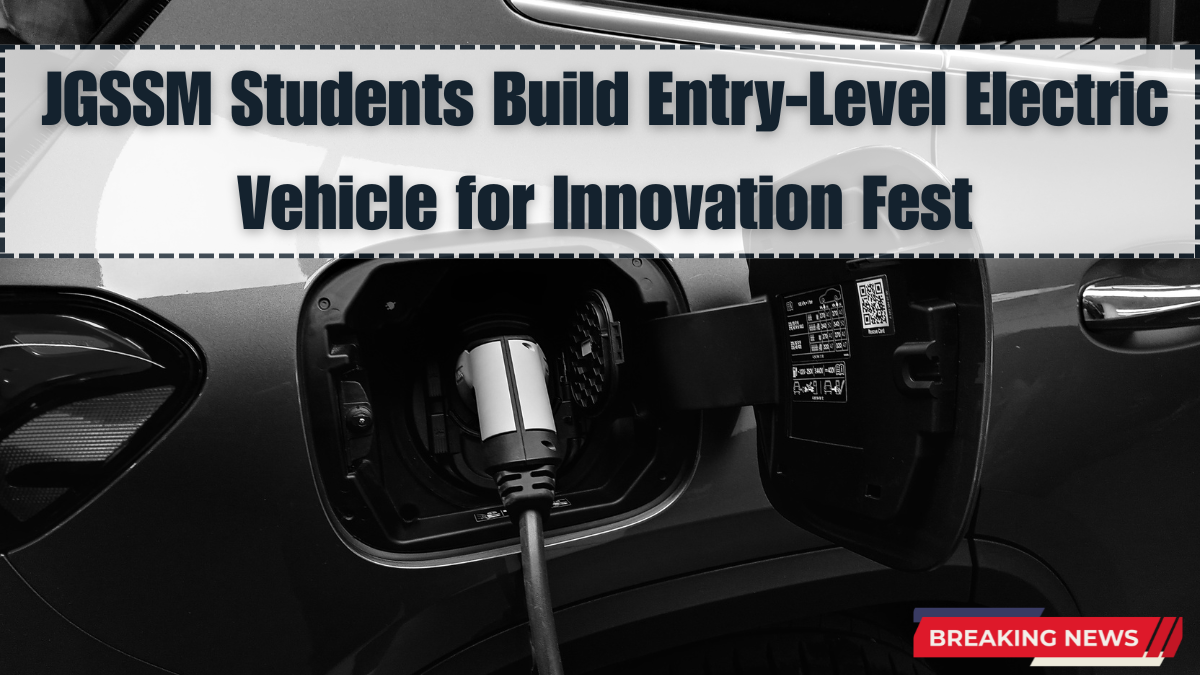Engineering students at JGSSM College have taken a major leap in applied learning with their successful development of a working electric vehicle prototype. Created as part of their Student EV Projects, the compact, entry-level electric vehicle was built for a national Innovation challenge hosted by a reputed inter-college tech fest. This achievement reflects the growing emphasis on hands-on learning and Student Innovation in India’s technical institutions.
The prototype was designed to demonstrate both technical feasibility and environmental responsibility. The result: a fully functional, battery-powered EV built entirely on campus using sustainable components and locally sourced parts.

The Project Vision and Objective
The main goal of this Student EV Project was to promote clean mobility using accessible and low-cost engineering solutions. The EV had to meet the challenge brief—create a functional, scalable electric vehicle for use in small towns or institutional campuses.
Objectives achieved:
-
Demonstrated low-cost EV design for urban/rural use
-
Used recycled components and lightweight materials
-
Built under ₹50,000 budget
-
Created a real-use EV with working throttle, battery, and controller
-
Participated in a live track test during the Innovation challenge
The JGSSM team worked in collaboration with their faculty mentors and external advisors from the EV manufacturing sector.
Design Features and Technical Highlights
The project reflected true Student Innovation, blending classroom theory with real-world engineering. The team used CAD software, 3D-printed casing parts, and repurposed lithium-ion batteries to meet their design goals. The final model met the safety and performance benchmarks set for the event.
| Component Used | Description |
|---|---|
| Motor | 500W brushless DC motor |
| Battery | 48V lithium-ion battery (swappable) |
| Frame | Mild steel with aluminum support |
| Body | Lightweight fiberboard panels |
| Controller & Display | Digital throttle with LED status light |
With this level of detail and functionality, the Student EV Project not only won recognition at the competition but also impressed the industry mentors in attendance.
Impact of the Project on Campus Innovation
This project has become a turning point for Student EV Projects at JGSSM. The successful EV prototype has now inspired juniors to join design clubs, apply for internships in EV Design, and consider startups in clean tech. The administration is also considering allocating funds for a dedicated “EV Lab” on campus.
Outcomes of the project:
-
Created a practical learning experience in mobility design
-
Boosted team-based learning and interdisciplinary collaboration
-
Generated interest in Innovation challenge competitions
-
Helped students build portfolios for future internships
-
Increased awareness of sustainable transport solutions
Such projects prove how institutions can empower students to become creators of the future, not just consumers.
Fostering a Culture of Engineering Innovation
What began as a college-level entry to a fest has now grown into a full-fledged case study in Student Innovation. The students plan to further enhance the prototype with smart sensors, GPS tracking, and solar charging.
How JGSSM is encouraging Student EV Projects:
-
Launching project-based learning modules for 2nd and 3rd year students
-
Setting up campus grants for innovation teams
-
Hosting internal EV challenges and exhibitions
-
Partnering with EV companies for mentorship and judging
-
Including EV-focused electives and labs in the new curriculum
By integrating EV Design into real-time projects, the college is shaping future-ready engineers who understand sustainability and technology in equal measure.
FAQs
What was the main goal of the Student EV Project at JGSSM?
The goal was to design a low-cost electric vehicle prototype for an Innovation challenge and apply sustainable engineering principles in real-world settings.
How many students were involved in the project?
A core team of 12 students from mechanical, electrical, and computer science departments collaborated on the Student Innovation initiative.
What was the budget of the prototype?
The entire vehicle was built under ₹50,000, showcasing smart material selection and effective cost control in Student EV Projects.
Did the vehicle participate in a live competition?
Yes, the EV was tested in a real-use scenario during a national Innovation challenge and successfully completed the required performance rounds.
Will JGSSM continue supporting EV projects?
Absolutely. The college is now encouraging more Student EV Projects and planning to launch a dedicated EV Innovation Lab to nurture future models.
Click here to know more.
